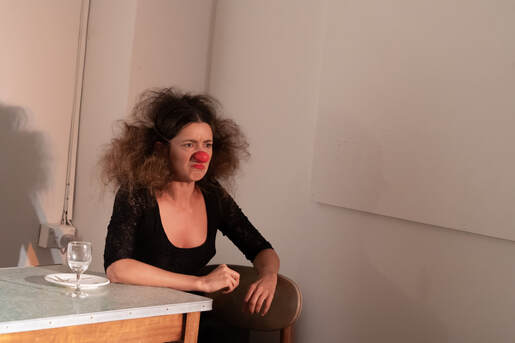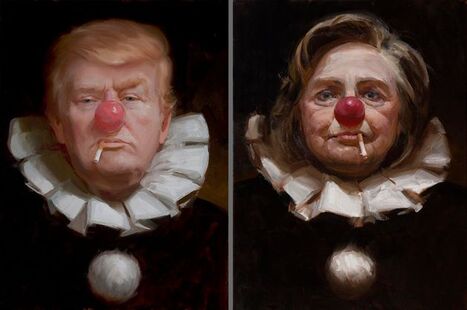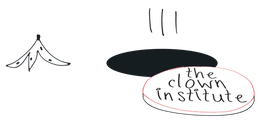|
Clowning is in the heart business, not only does it help heighten our immune system it can also make the heart stronger, plus the clown can touch our hearts too. A clown is to be your heart on stage, whether that be the stage of life or a theatre. Sometimes we go through experiences that feel too large or significant for words to fully capture, and that is where art, our hearts, and clowning becomes useful; we go to humour, symbols, and imagery to tell our stories. Isn't that wonderful? When I first set out to put together the Clown & Melodrama workshop back in late 2019, it was born out of curiosity and desire to express my despair and to find a playful way to transform that heartbreak into physical comedy. My questions were: what's the most fun way to create clown performances from these identifiable life moments and personal struggles, and secondly could these clown performances inspire laughter, hope, and healing in others?
In devising the workshop, I decided to review my time as a student at the Jacques Lecoq school, combining principles (or provocations) from subjects we learned like melodrama, tragic chorus, and clown. I wanted to understand how best to take an audience on a pathos-fuelled journey, via tears and laughter. I remembered the work we did in the first year exploring music and the counter mask where we moved the opposite way, or against the rhythm of a musical composition. As students writhing around to the music, we'd find an absurdity – a kind of sense in the nonsense. So, I mused why not apply this similar counter mask idea to create a clown logic that reverses the audience's expectations and that could potentially tug at the heart too. I found that we can take a very serious subject like the separation of a couple and observe how the clown subverts this situation by playing against it, by using an opposite expected rhythm. The improvisation plays out like this: The clown arrives home from a long day of work and hustling to find their spouse (played by an actor in realism) furiously packing and stuffing their personal belongings into a suitcase. The most obvious reaction is for the clown to play sadness or rage. This would be the boring choice and as the audience yes, we'd feel pity for the clown but would we be transformed, is this going to tickle our funny bone and make us love the clown? My guess is - not really. But what if the clown were to walk in, pause and observe their spouse packing, suddenly change their rhythm by excitedly grabbing their dusty suitcase, snorkel gear, and beach towel under the notion that they were together going on a romantic getaway. To add insult to injury, we then hear a knock at the door and the clown's spouse greets a stranger with a passionate embrace and kiss. The clown, stunned and wide-eyed now chooses an unexpected rhythm hurriedly walks up to the stranger shakes their hand, and offers them a generous tip, mistakenly believing the new lover is the cab driver that will drive them to the airport. It is 200% more fun and surprising for the clown, your scene partner, and the audience when we get to play against the obvious and alternate the expected rhythms. Here we can access vulnerable states, paradoxes, and reversal of order which benefits the clown enter into a playful tragic realm. It removes all sentimentality so it is the audience who does the work of feeling (the gooey heart stuff) and this can hopefully lead to transformation. What is the transformation? In this scenario it is about us, the audience, connecting to the fool's misunderstanding. Around the world, we're all fractured and socially disconnected. In clowning and clown training we can engage laughter and play in direct action towards social justice, to alleviate pain and suffering, and to remind us of our humanity. The clown's role in theatre or social contexts has become clearer to me over time; they're the guiding light of hope. They're the eternal dreamer showing us the way that with every human disaster there's an opportunity to create a space for connection, to experience empathy. The Clown and Melodrama workshop aims to access a playful dimension to our human tragedies. Day one of the workshop is focused on the journey of the emotions and opening the clown's heart first because before we can begin to perform 'heart surgery' on others to some degree we must be prepared to access our vulnerable states and stories first. Day two of the workshop is then dedicated to improvisation and games around how the clown can stay optimistic despite a terrible situation, as well as devising clown creations. It's easy to be playful and laugh when we are feeling good, but it is when the world seems bleak that we need to laugh the most in our lives. Our laughter then echoes in the chambers of our hearts, filling the empty spaces with pure joy and fun. This is one of my all time fave quotes and moments in a film. It sums up for me the profound sentiment I have following a clown workshop; it’s a feeling of stupefaction and awe at each person’s capacity to share something usefool with the world. The Fool: I am ignorant, but I read books. You won't believe it, everything is useful... this pebble for instance. Gelsomina: Which one? The Fool: Anyone. It is useful. Gelsomina: What for? The Fool: For... I don't know. If I knew I'd be the Almighty, who knows all. When you are born and when you die... Who knows? I don't know for what this pebble is useful but it must be useful. For if its useless, everything is useless. So are the stars! - Excerpt from La Strada As I get ready to run a morning weekend clown workshop I watch new students roll in donning their adulthood overcoats. When they arrive some hang back politely happy to make small talk sharing timid smiles, there’s the slightly perplexed face of ‘somebody who doesn’t know’, and others who are excited raring to go.
One of my greatest pleasures is observing the loosening of the presentable and acceptable version of adulthood into disarming playfulness within minutes as we engage in one of our first games called ‘Soul Train’. Music is a fabulous motivator; I’ve seen some jaw-dropping situations. There are particular songs that transform us even if it is for just a moment – they can make us strong, brave, sexy, completely savage, etc… and the best part is that it’s totally okay if that’s what we think we’re being at the time! We play these types of games not to prepare you for an audition on The Voice or to demo what an accomplished professional dancer or singer you are, rather it’s to discover something about yourself and ultimately about your clown. It’s a real joy to watch a person’s willingness to crack open their bodies, voices and hearts and trumpet their unabashed creativity alongside a bunch of strangers elevating their stupidity to the next level. It’s a reciprocal ride of generosity and tuning in to one another, what French acting instructor Jacques Lecoq coined during his pedagogic journey as ‘complicité’. There is a shared understanding and a real sense of connectedness in the room; everyone’s rooting for you and there’s a desire for one to succeed. Let’s face it adulting can be pretty combative and pressurizing sometimes; ‘get a job’, ‘stand up straight’, ‘eat with your mouth closed’, ‘love me!’ and so on, and clowning is one way to flip that on its head. It’s like a huge empathetic boost inviting us all to unleash our fun on and anarchic ways. A shared laugh is a shared feeling after all. It is the end of the morning weekend workshop, as people say their goodbyes and thank yous it’s plain easy to see that some of us are reluctant to take our adulthood overcoats back home. I’ve realized I teach others in order to learn myself. It is tricky to identify as a teacher, in fact, I am simply there to guide and shine the light in the direction where your clown wants to go. It’s a process of mutual discovery and I’m very fortunate because it is one of the finest ways to learn about the human condition, which I find usefool. I don’t know for what but it must be useful. Be honest. Be Stupid. Be interested. Play. Be vulnerable. Play. Play. Play. I sat on the couch one day and interviewed myself. What is the essence or spirit of the clown? To be stupid (from the Latin stupere 'to be amazed or stunned’); to be your heart on stage, whether that be the stage of life or a theatre; it is to be a child wandering through the world without any defence - it is to be completely vulnerable. This just may be the spirit of the clown, and it may just be living inside us waiting to be gently or rudely coaxed out. It is like opening up a tiny rose bud and revealing who's inside. Tell yourself about this art form that you speak of? It is an art form embedded in practice and the dedication of our bodies and imagination to the art & science of nonsense. I am mostly interested in the clown's humanity... the poetic clown. The poetic clown? Clowns love beauty and lead with hope in their hearts. Clowning is a celebration of our beautiful nonsense. Clowning can help us get one step closer to understanding the human condition. We laugh at the clown, we laugh at ourselves - because in my experience the clown reveals the truth and is ultimately a reflection of who we all are, universally. We (the audience) crave an authentic conversation. What does this look like? In a workshop scenario I like to encourage making BIG poops on stage (metaphorically speaking). This is a GOOD thing. It's about observing the poop, see if the poop is beautiful, poke around at it, make the poop dance, ask it to sing a song.. we basically want to get to know what's so special about your poop? You're given permission to mess up in a safe and fun environment. Umm.. please explain poop?
What I mean is that through a series of beautifool experiments we'll learn to access our sense of play, wonder and imagination and invite you to amplify your comfort zone - share your fears, fantasies and true desires with an audience. This sharing comes with an element of 'being seen' and sometimes we make a poop (or flop) as a result but failure is not the focus. We dig in and search for eccentric and unusual ways of doing things; the clown way. Is clown training for me? My coaching and workshops are designed to allow you to discover your own clown at your own pace and reach a pleasure and freedom of being on stage. The teaching is active and reflective-driven encouraging everyone to take on the dual student-spectator role. I sometimes work with the red nose, the teeny tiny little mask. Sometimes we don't use it, but we know it's there just in case. Ultimately we wear the mask so we don't have to. The best way to know if it's for you is to give it a go. What's the best that could happen? What is a clown? This is a difficult question to answer. I'm not talking circus oversized shoes and flower water squirters or politicians. It's about sophisticated approaches to reflecting reality. Dickie Henderson, Sacha Baron Cohen, Lucille Ball, Slava Polunin, Giuletta Masina, Woody Allen, Jacques Tati, Angela Castro, Zach Galifianakis, Kristen Wiig...and so on. Your parting words... Discovering clown and its ability to give us the freedom to be ridiculous meant only one thing for me; to build a community of more beautifool people & share the delightful mess of clowning. Whether you're an actor or a civilian. Say hi. |
AuthorAlicia Gonzalez is a clown and coach living the beautifool life. Archives
July 2024
Categories
All
|


 RSS Feed
RSS Feed
